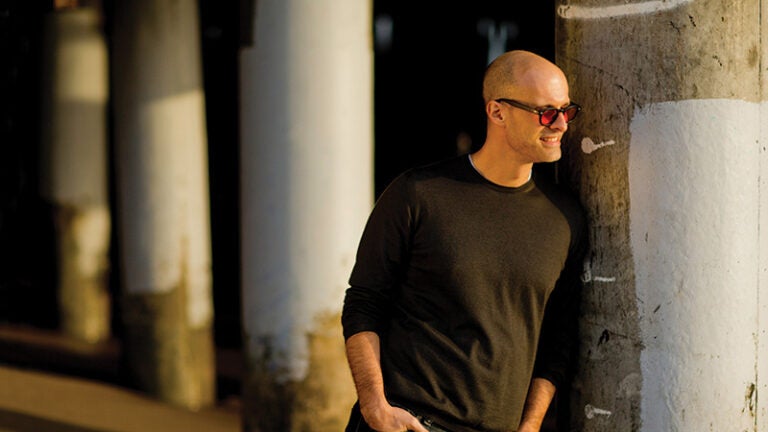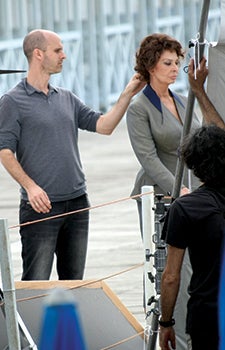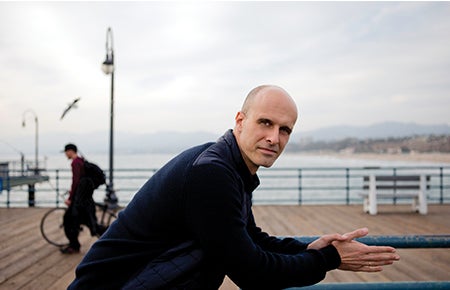
The Craftsman
Taking a break from his work to talk about filmmaking, Edoardo Ponti’s eyes lit up. He leaned into his seat, a plush booth at the Soho House West Hollywood with a bird’s-eye view of Los Angeles, where he had been typing intently on his laptop moments earlier. Looking out on the city engulfed in a dreamlike haze that unfurled into infinity, Ponti considered his own journey from Geneva, Switzerland, where he grew up, to the heart of the industry, which he now calls home. Ponti, 43, felt Hollywood’s pull as far back as he can remember.
“When I was 4, my brother who is four years older would practice piano in the living room,” Ponti recalled. He shifted in his seat and thoughtfully pulled at his closely trimmed salt-and-pepper beard. “I remember very specifically. I was next to him playing with my cars and little toy ships using his music as the musical score to my scenes. When he played a dramatic piece, I would use that to have my ships sink; when he practiced something more high octane, I switched to a car chase.”
You could say filmmaking is in Ponti’s blood. His family’s influence is most evident in his eyes, the same vivid hazel as those of his mother, Oscar-winning actress Sophia Loren, and in his profile, which echoes that of his late father, prolific movie producer Carlo Ponti. (His brother, Carlo Ponti Jr., whose practice provided the score to Edoardo’s playtime, is now a composer and orchestra conductor.)
However, Ponti, whose films have been shown and honored at the Cannes, Venice, Tribeca and Toronto film festivals, has forged his own path in Hollywood. He has written and directed the feature films Between Strangers (2002) and Coming & Going (2011), and has also written, directed and produced several stage plays, as well as an opera. Most recently, Ponti adapted Jean Cocteau’s 1930 play La Voix Humaine into a short film starring Loren.
When it comes to filmmaking, Ponti considers himself less of an artist and more of a craftsman.
“I’ve always approached film as a craft,” he explained. “That means practice, discipline and not being afraid to take risks.”
Ponti credited his parents for instilling in him a strong work ethic that lends itself to this apporach.
“My parents taught me not to take anything for granted, nothing is owed to you. You have to work hard for it,” he said. “You cannot reach your potential unless you work hard to sharpen your craft.”
The Universe of the Detail
Like so many other aspiring writers and directors, when he was starting out, Ponti moved to L.A. to follow his dream. At 18, he enrolled in the cinematic arts program at USC, ranked among the top in the nation. Immediately, he felt that he had made a mistake.
“A month in, I realized that studying film so young wasn’t the best way for me to become a filmmaker,” Ponti said. “Film was the tool I’d be using to tell stories, but in order for me to get the emotional and life ammunition to be able to tell stories, I had to study writing and the great authors.”
Ponti switched his major from film to creative writing and made poetry the focus of his studies.
“I’ve always written poetry, so for me it was a very natural mode of expression,” he explained. “Poetry is about getting at the core of things. It’s about the universe of the detail but also about rhythm. And film is also about rhythm, detail and finding the essence in every moment.”
Ponti eventually returned to study film, earning his master’s from the USC School of Cinematic Arts in 1998. But studying poetry helped Ponti to build his toolkit.

Edoardo Ponti and his mother, Sophia Loren, on the set of Voce Umana in 2013. Ponti directed the short film based on Jean Cocteau’s 1930 play La Voix Humaine. Photo courtesy of @SGP.
“When I write poetry I’m at my freest,” Ponti said. “It has become an amazing way to express anything I want without the confines of a narrative. Whatever I want to say, I can say in poetry.”
Ponti described his earliest poems as incredibly long, and very personal. It was when he began to direct his writing into short, focused narratives that a light bulb went on for him as a storyteller.
“It liberated me,” he said. “I could pack as much meaning into a vehicle that was much shorter. And that really has to do with discipline and rhythm. Finding the right rhythm for the right message was something that I really learned in poetry. And that, in film, is enormously important because that’s one of the ways you start thinking of tone.”
Ponti counts David St. John, University Professor of English and Comparative Literature at USC Dornsife, as one of his most esteemed mentors.
Ponti recalled that in his writing workshops, St. John would be both very objective and sharp in his feedback but, at the same time, very gentle and human about it.
“You would allow yourself to listen to his criticism,” Ponti said. “You were elevated by it. And that was a wonderful way for all of us to come together to share our innermost feelings in a safe, nonjudgmental environment — an environment that really helped us sharpen that skill through intelligent, constructive criticism.
“To this day, when I write a poem, it is David’s voice that I hear,” he said. If it sounds like St. John could read his poem — that the words fit his vocal pattern — Ponti will keep it. He called St. John his “aural litmus test of whether or not a poem works.”
The Magic in the Mundane
Studying poetry also reinforced for Ponti the fact that discipline is essential for success, especially for someone working in a creative field. That means tapping into inspiration as time allows, not just waiting for the muse to strike.
“That’s what being a professional means. You can switch on inspiration,” Ponti said. “If your schedule only allows you to write between the hours of 1 and 6 p.m., what happens if inspiration strikes at 6:30? You missed that train and that can’t happen, so you have to be able to access inspiration almost at will. It becomes a muscle. The more you write, the more you can access it.”
As an undergraduate, he would “switch on” his inspiration using the commute from USC to his home 40 miles north of Los Angeles to write a poem every day.
“I had this self-imposed exercise in college. It’d take me around one hour to drive back home from USC and I would use that time to compose a poem. I would create it in my mind as I was driving, repeating the lines I liked, and adding to those verses. I never used a Dictaphone. And when I got home, I had a poem that I would transcribe. I wrote countless poems like this, in my head, stuck on the 101 freeway. You could say that the 101 became my muse!”
The time Ponti spent mulling over his words became an important blueprint for his creative process.
“It’s about sharpening your ability to envision something before it exists,” he explained. “That period of gestation is very important because that’s how your inner life and your experiences are allowed to merge.”
However, Ponti embraces the moments when his creativity is sparked organically. After all, a storyteller’s antennae are always up, he said.
“If writing or telling stories is your passion, you don’t even do it consciously. That part of you is always on,
seeking out the next story or image or moment from the most mundane detail in life. The trick is to uncover the magic in the mundane.”
A Lifelong Process
Ponti’s first term at USC’s film school was intense but incredibly fruitful.
He recalled fondly that he focused on “surviving because they throw the camera at you and say, ‘Now, go make a movie.’” The emphasis quickly shifted to developing his voice as a storyteller.
“This is a lifelong process, finding your voice,” Ponti said. “It’s about tone; it’s about the themes that interest you; it’s about where your eye goes in a room; it’s about what life moments touch you, what music makes you cry. Finding your voice is understanding who you are.”

Photo by John Livzey.
Revelation struck the first time he watched the Three Colors trilogy — the films Blue, White and Red — by renowned art-house director and screenwriter Krzysztof KieÅ›lowski.
“Every filmmaker, every writer needs to find that person who speaks to the deepest part of themselves. For me, KieÅ›lowski was the one,” Ponti said. KieÅ›lowski’s ability to shoot a drama with the tension and suspense of a thriller, coupled with his attention to human detail, inspired Ponti.
“When I saw his films — in the humblest of ways — I saw myself in them; they gave me the courage to tell my own stories.”
Ponti has since been exploring the themes that pique his interest as a storyteller. The one theme that he sees reoccurring throughout his own work is resilience — evident in his most recent film, Voce Umana (Human Voice), which captures a jilted lover’s fight for her unravelling relationship.
“I’m interested in the stories of people fighting their battles against all odds, swimming as hard as they can against the current of things but never losing hope. Faced with a wall of ‘nays,’ they are the only ‘aye,’ ” he said.
Voce Umana
With two staccato peals, a phone rings. A woman’s voice answers urgently: “Pronto? Pronto?”
So begins Ponti’s short film, Voce Umana. The story centers on a phone conversation between a widow and her lover, who is leaving her for another woman. Viewers are privy only to the woman’s side of the dialogue as she slowly breaks down while learning of his betrayal.
In Ponti’s adaptation, which was released in 2014, the woman is played by Loren, who effortlessly embodies her character, sliding between anxiety, outrage, strength and desperation.
“The dynamics between men and women have dramatically shifted from the time Cocteau wrote the piece,” Ponti said, “so I had to make sure the piece spoke to a contemporary audience but at the same time stayed true to itself.”
Ponti had his adaptation translated from the original French to Neapolitan, the language of Naples, Italy, which he felt accentuated the protagonist’s strengths.
“Translating the text reinforced the female character,” explained Ponti, who is himself a polyglot fluent in English, French and Italian. “French is a very intellectual language, a language of the mind, and Neapolitan is a very visceral language, born in your abdomen — in your gut. So when the character speaks Neapolitan, without changing the words she gains an inner strength that she really didn’t have in French.
“It was quite amazing seeing the transformation of a character just by shifting the language. Languages reside in different parts of you, and a language that resides in your head is very different than a language that resides in your gut. It affects the power and the impact of a character enormously.”
The film ends with the inscription: “per mamma” — “for my mother.” Ponti, who had previously directed his mother in the feature film Between Strangers, called working with her on such an intimate project an “amazing process.”
“She was very nervous to do this movie because it’s really a litmus test for all the greatest actresses in the world,” he said. The two rehearsed the piece for six weeks before shooting began.
“It was me and her sitting in a hotel room, face to face going through every line, every nuance, every color of the emotional journey that this woman was going through.”
The piece garnered acclaim, screening at the 2014 Cannes Film Festival, the 2014 Tribeca Film Festival and the 2014 HollyShorts Film Festival. Loren won a 2014 David Di Donatello Award, Italy’s top film honor, for her performance. Last April, Voce Umana debuted on Turner Classic Movies as part of a five-movie tribute to the actress.
Finding Balance
Film school had another profound impact on Ponti’s life. It’s where he met his wife, actress Sasha Alexander, who plays chief medical examiner Maura Isles on the popular TNT television series Rizzoli & Isles. At USC, the two would run into each other in common areas on campus between classes.
“We were just friendly. And then, 10 years later, we bumped into each other and the rest is history.” Ponti smiled. They have now been married for nine years and have two children together.
Ponti is comfortable moving between the different roles he inhabits — writer, father, husband and filmmaker.
“People think, ‘Oh, I haven’t allotted enough time to writing because I was busy being a father.’ But the truth is they’re not mutually exclusive. Being a father enriches you as a writer and vice versa,” he explained. His philosophy is that everything balances out.
“You’re not taking anything away from one part of you when you focus on another facet of your life. Each facet feeds into the other, deepens the whole. You take the lessons from every part of you and apply them to all of you.”
Ponti reached for his computer. After all, it was the middle of the work day. A cool breeze drifted through the open windows nearby. With the laptop open on the table in front of him he leaned back in his seat and paused for a moment, ever the composed wordsmith. He concluded, “If you understand that everything is connected in your life, you’ll be fine.”
Read more stories from USC Dornsife Magazine’s Spring-Summer 2016 issue >>